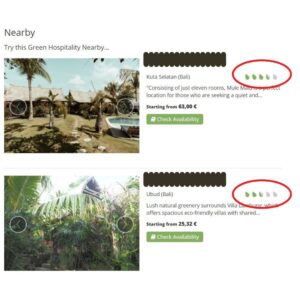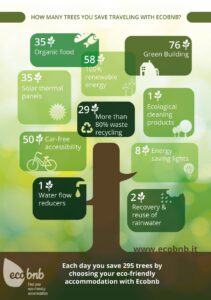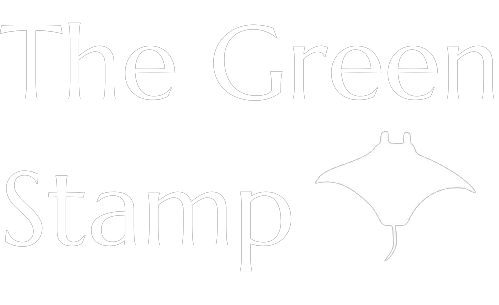A little while ago we asked our followers on Instagram what information they would like us to post more of. Out of this poll, it became clear that you are all excited to learn more about sustainable accommodations. To accommodate this wish we are extremely happy to dedicate a full blog post about Ecobnb!
At the start of our sustainable journey, we felt the urge to greenify basically all elements within our lifestyle. The way we moved from A to B, the food we ate, the products we purchased and used, but also our accommodations. At first, we weren’t aware of Ecobnb, which made us try to look and book sustainable accommodations through the regular platforms most people use. We ended up spending hours trying to find that one accommodation that had the least environmental impact and operated most sustainably. In all honesty: it felt extremely time-consuming! But we are happy we did because, during one of those searches, we came across Ecobnb. And man did Ecobnb simplify our lives!
So, what is Ecobnb?
In short: “In Ecobnb you can find ecofriendly accommodations”
Though we believe this gives an extremely powerful summary of what they do, we want to dive deeper into their work. Simply because we think Ecobnb has such a great mission, it deserves to be shared. Ecobnb is a marketplace to book accommodations, exclusively for accommodations that have a low environmental impact. By doing this, Ecobnb is dedicated to a journey that will change the way we travel. For those who are familiar with the work that the Green Stamp does: Ecobnb her mission fits perfectly with ours, right?

The thing we like the most about Ecobnb is that they have all sorts of sustainable accommodations listed. They work with tree houses, ice-igloos (isn’t that just great?), organic houses, and many other eco-types.
You might be wondering, what requirements are needed for an accommodation to be listed on Ecobnb? Therefore, we want to dive into the 10 different requirements Ecobnb works with:
- The first requirement Ecobnb sets is that accommodations use organic food in the setup of their menu. Accommodations don’t work with GMO products (genetically modified food).
- The second requirement Ecobnb has set, dives into the topic of lowering the environmental impact of buildings. This means the accommodations use materials with energy-efficient technologies to build the accommodation itself. They also work from local sources. In short, Ecobnb works with ‘Green building’. The listed accommodations that meet this requirement are designed in harmony with the natural resources and natural features.
- The third requirement by Ecobnb has gained more popularity over the last few years. The requirement we are talking about is 100% renewable energy. This means that the listed accommodations by Ecobnb that work with this, solely work with electricity gained by natural sources. Examples are wind energy, geothermal energy, and solar energy.
- While addressing solar energy we automatically reach Ecobnb her next requirement: the use of solar thermal panels to generate hot water. These hot water systems may also be used for other things, such as pool heating.
- A requirement that we personally get very excited about, the fifth requirement by Ecobnb is to use natural cleaning products. These need to be biodegradable and environmentally friendly. Shortly worded: Ecobnb doesn’t want accommodations to use chemicals cleaning products. Love, love, love this!
- Next up is a requirement by Ecobnb that evolves around waste recycling. Different types of waste should be separated, recycled, and eventually disposed of in the correct way. The exact requirement by Ecobnb is that the accommodation does this up to 80% of its waste.
- As shared in one of our blog articles if you’re looking to greenify your travels, it’s important to reach your destination with environmentally friendly public transport. We, therefore, love that Ecobnb works with the requirement that the accommodation should be accessible by public transport. Also, the use of public transportation should be encouraged by offering some sort of incentive (such as price reduction).
- The eighth requirement by Ecobnb is about the use of energy-saving lamps. They want accommodations to have at least 80% energy-saving lamps. The fun fact about energy-saving lamps is that they usually also have a 10 times higher durability!
- Requirement number nine by Ecobnb is one we feel can’t miss. This requirement states that accommodations should work with water flow restrictors to reduce water consumption. Ecobnb also wants the accommodation to promote this to their guests to save water.
- Last but not least, requirement number 10 by Ecobnb: the reuse and recovery of rainwater. Ecobnb wants accommodations to collect rainwater, which they can then reuse for secondary use.

We want to point out that these requirements by Ecobnb are self-certified by the accommodations and are afterward verified by travelers. As you can see in the image below, Ecobnb displays leaves next to their listings. An accommodation should have at least 5 of the above-mentioned requirements to be listed by Ecobnb. The shown leaves indicate how many requirements are met by the accommodation. Zero green leaves equal 5 met requirements, five green leaves equal the accommodation meets all 10 requirements.

Let’s book at Ecobnb
Booking your stay at Ecobnb is extremely easy! On the homepage you fill in the following information:
- Place where you want to stay (Ecobnb accommodations are found worldwide!)
- Check-in date
- Check-out date
- How many adults, and how many rooms do you want to book
Easy peasy right?!
To end this blog article about Ecobnb in a fun way we want to address that Ecobnb has calculated how many trees you save by booking an eco-friendly accommodation. For more information about this click here.


Written by: Carmen Castricum


